Cognitive Behavioral Therapy
What is Cognitive Behavioral Therapy (CBT)?
At some point, most of us experience some difficulties with negative thoughts about ourselves or the world around us. These thoughts may keep us from being able to live a more peaceful and meaningful life. Ongoing negative and sometimes extreme thoughts will automatically trigger certain feelings. These feelings, in turn, will also affect the way that we behave.
A situation, event, or memory might trigger an automatic thought. This thought might then conjure up certain feelings, and these two factors together will then impact how you behave. Most of us aren’t really conscious that we’re doing this.
Have you noticed that you’re feeling unsettled about how you react to certain things? Not sure how to make changes? Consider speaking to a trained therapist about Cognitive Behavior Therapy, also known as CBT.
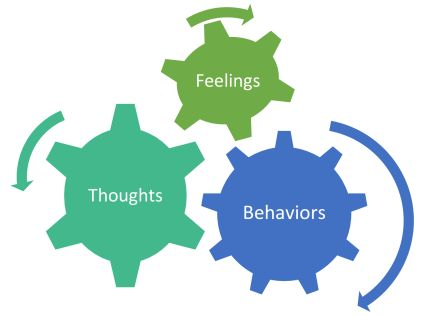
Unfortunately, we sometimes tend to get “stuck” in certain thoughts, feelings, and actions – and those habits are not always helpful. We might think about things that make us stressed, or fearful. Or, we might tell ourselves that we are “not good enough”, “broken” or “bad.” We might feel down, irritable, anxious, or confused.
At times, we might turn to isolation, act impulsively, or use food or alcohol to “numb” the thoughts and feelings that are so distressing. If not addressed over time, these sorts of things can lead to more serious emotional and psychological issues.
How can CBT help me?
Cognitive Behavioral Therapy’s effectiveness has been proven through a long history of research. Its approach and strategies can be combined with other therapeutic techniques to successfully “retrain the brain” and make changes in neural pathways. CBT can help treat:
- Depression
- Anxiety
- Insomnia
- Relationship Issues
- Low Self-Confidence
- Feeling Lost or Confused with Life
- Panic Attacks
- Identity Issues
It is also designed to help you begin to make changes, change old thought patterns, and free yourself from difficulties such as:
- Ongoing negative thoughts and underlying feelings and behaviors that get in the way of your daily functioning or overall quality of life
- Wanting to change a behavior that impacts your life at home or work – but not knowing where to start
- Having trouble taking control of your life because seeing things in a positive light is challenging for you
- Making the same mistakes over and over with an inability to change or achieve the goals you set for yourself
CBT for Depression
When people become depressed, they tend to think in ways that are negative, pessimistic, and self-defeating. They also tend to feel constantly down, sad, tearful, and tired. And when people think that way and act that way, they also tend to withdraw from others, take poor care of themselves, and become physically inactive. The goal of a therapist using Cognitive Behavioral Therapy is to help you to overcome depression by helping you to learn how to modify or change some of those thoughts, feelings, and behaviors.
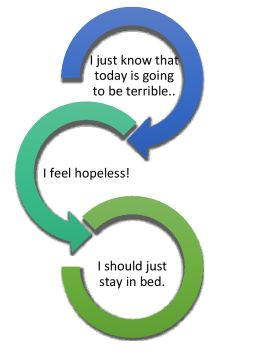
One of the ways that Cognitive Behavioral Therapy helps to change thoughts and behaviors is by providing you with the tools you need to help you to change the way you think about certain things. For example, if you are able to learn how to modify your thought from “today is going to be terrible” to “today may not be perfect, but it might not be so bad,” you might notice a difference in how you feel.
Having a slightly different perspective can alter the way you feel and act throughout the day. In the example above, you might start focusing on small things that will help you build motivation to do certain things despite how you feel – “no matter how down I am feeling today, I am going to get out of bed.” The slight change in this thought alone is often enough to begin to consider different, more hopeful perspectives.
CBT for Anxiety
Another major part of CBT involves learning to challenge irrational fears. Take a look at the general example below, which starts with a basic fear of getting into a car and quickly spirals into extreme worries. You might then feel nauseous or panicked about what might happen, which motivates you to avoid getting in your car that day. You avoided the fear (phew!), but now you are going to miss work, school, and other important responsibilities.
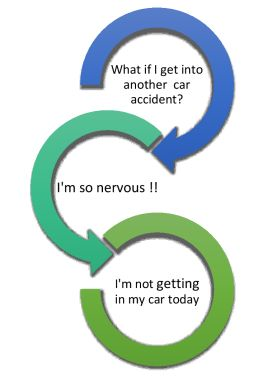
Many of our worries are based in reality – yes, you might get in a car accident – but the thought that you might get into another car accident is not entirely true and is based on fear, not a fact. Learning to notice moments when you make assumptions or think irrationally will help free your mind from being trapped in what CBT therapists call “cognitive distortions,” or simple mistakes our minds tend to make.
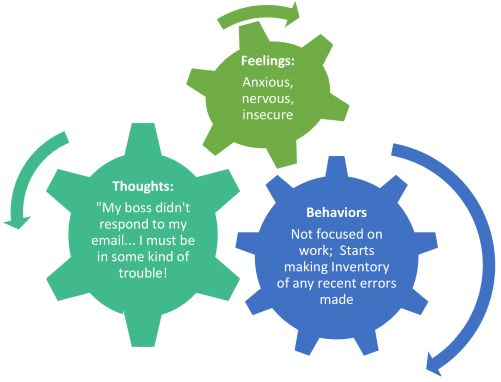
Just like with depression, anxiety tends to have interconnected thoughts, feelings, and actions that keep you “stuck” in your fears and worries. Often times, these thoughts and worries keep you from pondering what other factors exist that can render your negative thoughts completely untrue.
CBT for Insomnia
Insomnia, or difficulty falling and staying asleep, is an incredibly common problem. People struggle as they lay in bed, exhausted, as they attempt to will themselves into slumber.
You might toss and turn until you eventually reach for your book or smartphone to try and distract yourself. The hours tick by slowly, and in the morning, you continue to feel exhausted. Insomnia can negatively affect your work, relationships, and overall health, giving you more reasons to have difficulty falling asleep. A CBT therapist trained in insomnia can help you disrupt this cycle through a process called “behavioral activation,“ which is where you change your routine to influence how you think and feel.
In this example, we might begin by shifting your sleep pattern. This might involve making changes such as pushing your bedtime back an hour, adding in physical activity throughout the day, and limiting consumption of alcohol and caffeine.
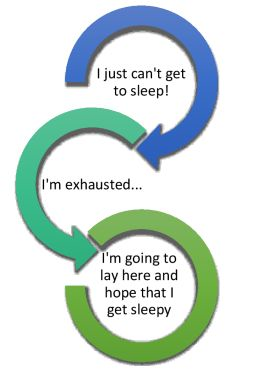
Is CBT right for me?
CBT may be a good treatment option for you if you’re ready to make meaningful and lasting changes in your life but don’t currently have the necessary skills to go about it. We provide cognitive behavioral therapy to adults from all over New York, both in person and via Telehealth.
Relevant Blog Posts
-
What To Expect In CBT Therapy
CBT stands for cognitive behavioral therapy. This is a type of talk therapy that helps individuals make sense of their problems by breaking them into smaller and more manageable chunks.
-
Cultivating Emotional Intelligence And Why It’s One Of The Best Assets To Have
When you grow up, you learn that there are certain things that are considered essentials in life in order to be successful.
-
What No One Tells You About Therapy (But Should!)
When you’re going through a stressful time or struggling with anxiety/depression, it can be difficult to ask for help, and it’s made even harder by the stigma that therapy can carry…which is exactly why we’re breaking down what no one tells you about therapy…but should!…
Have questions about weekly session rates and what to expect in therapy?
Happily serving clients in New York.



